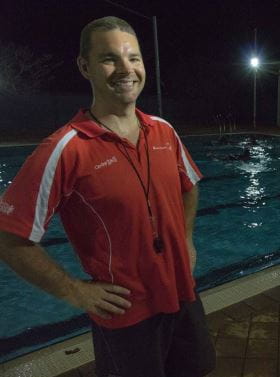Remote Aboriginal Swimming Pool Manager, Fitzroy Crossing
 Aaron Jacobs and his family have been involved in our Remote Aboriginal Swimming Pool project for the past 7 years. Aaron says the journey began after a friend, Scott Kendall, took up a position as a remote pool manager. “It sounded really interesting and a good opportunity to give something positive back to the community.That’s what I wanted to do so I completed my training and then a position came up in Jigalong.”
Aaron Jacobs and his family have been involved in our Remote Aboriginal Swimming Pool project for the past 7 years. Aaron says the journey began after a friend, Scott Kendall, took up a position as a remote pool manager. “It sounded really interesting and a good opportunity to give something positive back to the community.That’s what I wanted to do so I completed my training and then a position came up in Jigalong.”
Jigalong is an aboriginal community in WA’s Pilbara region, with a population fluctuating between 100 and 500 depending on the time of year. Aaron says, despite the initial culture shock,his family enjoyed their time there, especially seeing the impact the pool had on the local children “They’re very happy kids but they have a bit of a turbulent life so to see them with big smiles on their faces through simple things at the pool like an inflatable or a new toy it really made my day.”
After four years Aaron was offered a position at the Fitzroy Crossing remote aboriginal swimming pool and his family made the move to this much bigger town between Broome and Kununura. Aaron says it’s a great area but does have its issues. “The town is very segregated; the local people live in their communities and the white people live in town, but the pool does break down that divide and it was great to see them getting along.”
In Fitzroy Crossing Aaron was quite innovative, tackling some nighttime youth issues by opening up the pool for midnight swimming sessions. “There were a lot of adolescents engaging in anti-social behavior, break-ins and getting into trouble. So on the weekends I started doing sessions from midnight to about 3am and it brought a lot of teenagers down to the pool. They’d play basketball, do some Swim for Fruit, get out the guitars and it was just a good environment to be in, with someone there to supervise and act as a good mentor.”
For Aaron there were many highlights during his seven years at the remote pools, with the Swim for Fruit program the one that stands out most.
“Swim for Fruit started off in Jigalong and as soon as some of the kids started getting involved and prizes were drawn it drew a lot of people in. They became more and more competitive and by the end of my time there I couldn’t keep up with it; I had to get my wife Waiane to supervise and count the laps because so many children wanted to participate.”
Aaron’s hope is that the Remote Aboriginal Swimming Pool program continues to expand “There’s so many benefits, and I really do think there should be a pool in every sizeable indigenous community. Kids who have access to the water can swim from an early age, but for those who don’t there can be floods out there, and there’s a danger of them drowning. Water education and swimming lessons are vital to help prevent that.”
Personally for the Jacob’s family life is now in the south-west, “We actually didn’t quite want to leave Fitzroy but we have a young family so for social and academic reasons it was time to move on. But I do hope to still be able to work in aquatics because I really enjoy this line of work and you just feel like you’re giving something back to the community.”